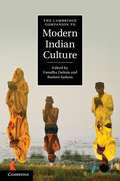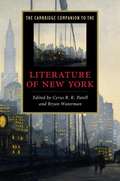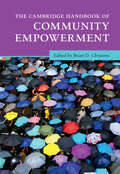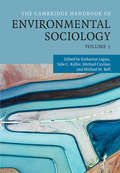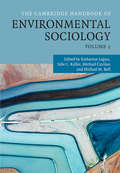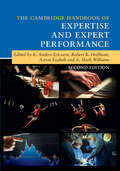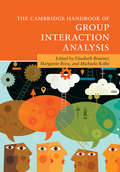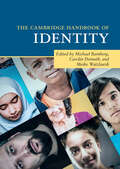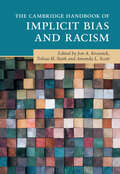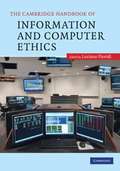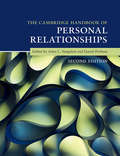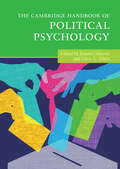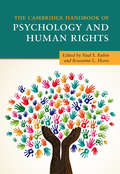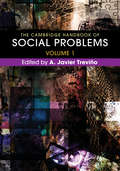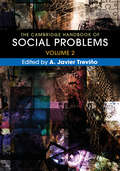- Table View
- List View
The Cambridge Companion to Keynes
by Roger E. Backhouse Bradley W. BatemanJohn Maynard Keynes (1883-1946) was the most important economist of the twentieth century. He was also a philosopher who wrote on ethics and the theory of probability and was a central figure in the Bloomsbury Group of writers and artists. In this volume contributors from a wide range of disciplines offer new interpretations of Keynes's thought, explain the links between Keynes's philosophy and his economics, and place his work and Keynesianism - the economic theory, the principles of economic policy, and the political philosophy - in their historical context. Chapter topics include Keynes's philosophical engagement with G. E. Moore and Franz Brentano, his correspondence, the role of his General Theory in the creation of modern macroeconomics, and the many meanings of Keynesianism. New readers will find this the most convenient, accessible guide to Keynes currently available. Advanced students and specialists will find a conspectus of recent developments in the interpretation of Keynes.
The Cambridge Companion to Modern American Culture
by Christopher BigsbyThe Cambridge Companion to Modern American Culture offers a comprehensive, authoritative and accessible overview of the cultural themes and intellectual issues that drive the dominant culture of the twentieth century. This companion explores the social, political and economic forces that have made America what it is today. It shows how these contexts impact upon twentieth-century American literature, cinema and art. An international team of contributors examines the special contribution of African Americans and of immigrant communities to the variety and vibrancy of modern America. The essays range from art to politics, popular culture to sport, immigration and race to religion and war. Varied, extensive and challenging, this Companion is essential reading for students and teachers of American studies around the world. It is the most accessible and useful introduction available to an exciting range of topics in modern American culture.
The Cambridge Companion to Modern Arab Culture (Cambridge Companions to Culture)
by Dwight F. ReynoldsDwight F. Reynolds brings together a collection of essays by leading international scholars to provide a comprehensive and accessible survey of modern Arab culture, from the early nineteenth to the twenty-first century. The chapters survey key issues necessary to any understanding of the modern Arab World: the role of the various forms of the Arabic language in modern culture and identity; the remarkable intellectual transformation undergone during the 'Nahda' or 'Arab Renaissance' of the late nineteenth and early twentieth century, the significant role played by ethnic and religious minorities, and the role of law and constitutions. Other chapters on poetry, narrative, theatre, cinema and television, art, architecture, humour, folklore, and food offer fresh perspectives and correct negative stereotypes that emerge from viewing Arab culture primarily through the lens of politics, terrorism, religion, and economics. Explores critical areas of Arab culture not covered in other volumes such as Arab humour, folklore, cuisine, law, and the role of ethnic and religious minorities. Brings together essays by leading international scholars along with a chronology, glossary and guide to further reading. Corrects many negative stereotypes that emerge from viewing Arab culture primarily through the lens of politics, terrorism, religion and economics.
The Cambridge Companion to Modern Indian Culture
by Vasudha Dalmia Rashmi SadanaIndia is changing at a rapid pace as it continues to move from its colonial past to its globalised future. This Companion offers a framework for understanding that change, and how modern cultural forms have emerged out of very different histories and traditions. The book provides accounts of literature, theatre, film, modern and popular art, music, television and food; it also explores in detail social divisions, customs, communications and daily life. In a series of engaging, erudite and occasionally moving essays the contributors, drawn from a variety of disciplines, examine not merely what constitutes modern Indian culture, but just how wide-ranging are the cultures that persist in the regions of India. This volume will help the reader understand the continuities and fissures within Indian culture and some of the conflicts arising from them. Throughout, what comes to the fore is the extraordinary richness and diversity of modern Indian culture.
The Cambridge Companion to Vygotsky
by Michael Cole Harry Daniels James V. WertschL. S. Vygotsky was an early-twentieth-century Russian social theorist whose writing exerts a significant influence on the development of social theory in the early-twenty-first century. His non-deterministic, non-reductionist account of the formation of mind provides current theoretical developments with a broadly drawn yet very powerful sketch of the ways in which humans shape and are shaped by social, cultural, and historical conditions. This dialectical conception of development insists on the importance of genetic or developmental analysis at several levels. The Cambridge Companion to Vygotsky is a comprehensive 2007 text that provides students, academics, and practitioners with a critical perspective on Vygotsky and his work.
The Cambridge Companion to Weber
by Stephen TurnerMax Weber is indubitably one of the very greatest figures in the history of the social sciences, the source of seminal concepts like 'the Protestant Ethic', 'charisma' and the idea of historical processes of 'rationalization'. But, like his great forebears Adam Smith and Karl Marx, Weber's work always resists easy categorisation. Prominent as a founding father of sociology, Weber has been a major influence in the study of ancient history, religion, economics, law and, more recently, cultural studies. This Cambridge Companion provides an authoritative introduction to the major facets of his thought, including several (like industrial psychology) which have hitherto been neglected. A distinguished international team of contributors examines some of the major controversies that have erupted over Weber's specialized work, and shows how the issues have developed since he wrote. The articles demonstrate Weber's impact on a variety of research areas.
The Cambridge Companion to the Harlem Renaissance
by George HutchinsonThe Harlem Renaissance (1918–1937) was the most influential single movement in African American literary history. Its key figures include W. E. B. Du Bois, Nella Larsen, Zora Neale Hurston, Claude McKay, and Langston Hughes. The movement laid the groundwork for all later African American literature, and had an enormous impact on later black literature world-wide. With chapters by a wide range of well-known scholars, this 2007 Companion is an authoritative and engaging guide to the movement. It first discusses the historical contexts of the Harlem Renaissance, both national and international; then presents original discussions of a wide array of authors and texts; and finally treats the reputation of the movement in later years. Giving full play to the disagreements and differences that energized the renaissance, this Companion presents a set of new readings encouraging further exploration of this dynamic field.
The Cambridge Companion to the Italian Renaissance
by Michael WyattThe Renaissance in Italy continues to exercise a powerful hold on the popular imagination and on scholarly enquiry. This Companion presents a lively, comprehensive, interdisciplinary, and current approach to the period that extends in Italy from the turn of the fourteenth century through the latter decades of the sixteenth. Addressed to students, scholars, and non-specialists, it introduces the richly varied materials and phenomena as well as the different methodologies through which the Renaissance is studied today both in the English-speaking world and in Italy. The chapters are organized around axes of humanism, historiography, and cultural production, and cover a wide variety of areas including literature, science, music, religion, technology, artistic production, and economics. The diffusion of the Renaissance throughout Italian territories is emphasized. Overall, the Companion provides an essential overview of a period that witnessed both a significant revalidation of the classical past and the development of new, vernacular, and increasingly secular values.
The Cambridge Companion to the Literature of New York
by Cyrus R. K. Patell Bryan WatermanA portrait of the diverse literary cultures of the city from its beginnings as a Dutch colony to the present.
The Cambridge Handbook of Community Empowerment (Cambridge Handbooks in Psychology)
by Brian D. ChristensPower and empowerment are critical topics for social change. This handbook maps out ways that people can collectively engage with, influence, and change systems that affect their lives, particularly the systems that maintain inequality and oppression. It includes in-depth examinations of a variety of approaches to building and exercising community power in local organizations, institutions, and settings. Each chapter examines a particular approach, critically engaging with contemporary research on how and when collective action can be most effective at producing change within communities and societal systems. By examining a range of approaches in diverse contexts, this book provides new insights for scholars, practitioners, and engaged resident-leaders aiming to be more precise, strategic, and innovative in their efforts to build and sustain community power. It is the ideal resource for those working with community groups to build more just and equitable systems.
The Cambridge Handbook of Consumer Psychology
by Michael I. Norton Derek D. Rucker Norton, Michael I. and Rucker, Derek D. and Lamberton, Cait Cait LambertonWhy do consumers make the purchases they do, and which ones make them truly happy? Why are consumers willing to spend huge sums of money to appear high status? This handbook addresses these key questions and many more. It provides a comprehensive overview of consumer psychology, examining cutting-edge research at the individual, interpersonal, and societal levels. Leading scholars summarize past and current findings and consider future lines of inquiry to deepen our understanding of the psychology behind consumers' decision making, their interactions with other consumers, and the effects of societal factors on consumption. The Cambridge Handbook of Consumer Psychology will act as a valuable guide for faculty as well as graduate and undergraduate students in psychology, marketing, management, sociology, and anthropology.
The Cambridge Handbook of Environmental Sociology: Volume 1
by Michael Carolan Julie C. Keller Katharine Legun Michael M. BellThe Cambridge Handbook of Environmental Sociology is a go-to resource for cutting-edge research in the field. This two-volume work covers the rich theoretic foundations of the sub-discipline, as well as novel approaches and emerging areas of research that add vitality and momentum to the discipline. Over the course of sixty chapters, the authors featured in this work reach new levels of theoretical depth, incorporating a global scope and diversity of cases. This book explores the broad scope of crucial disciplinary ideas and areas of research, extending its investigation to the trajectories of thought that led to their unfolding. This unique work serves as an invaluable tool for all those working in the nexus of environment and society.
The Cambridge Handbook of Environmental Sociology: Volume 2
by Michael Carolan Julie C. Keller Katharine Legun Michael M. BellThe Cambridge Handbook of Environmental Sociology is a go-to resource for cutting-edge research in the field. This two-volume work covers the rich theoretic foundations of the sub-discipline, as well as novel approaches and emerging areas of research that add vitality and momentum to the discipline. Over the course of sixty chapters, the authors featured in this work reach new levels of theoretical depth, incorporating a global scope and diversity of cases. This book explores the broad scope of crucial disciplinary ideas and areas of research, extending its investigation to the trajectories of thought that led to their unfolding. This unique work serves as an invaluable tool for all those working in the nexus of environment and society.
The Cambridge Handbook of Expertise and Expert Performance
by K. Anders EricssonThis 2006 book was the first handbook where the world's foremost 'experts on expertise' reviewed our scientific knowledge on expertise and expert performance and how experts may differ from non-experts in terms of their development, training, reasoning, knowledge, social support, and innate talent. Methods are described for the study of experts' knowledge and their performance of representative tasks from their domain of expertise. The development of expertise is also studied by retrospective interviews and the daily lives of experts are studied with diaries. In 15 major domains of expertise, the leading researchers summarize our knowledge on the structure and acquisition of expert skill and knowledge and discuss future prospects. General issues that cut across most domains are reviewed in chapters on various aspects of expertise such as general and practical intelligence, differences in brain activity, self-regulated learning, deliberate practice, aging, knowledge management, and creativity.
The Cambridge Handbook of Expertise and Expert Performance (Cambridge Handbooks In Psychology )
by K. Anders Ericsson Robert R. Hoffman A. Mark Williams Aaron KozbeltIn this updated and expanded edition of The Cambridge Handbook of Expertise and Expert Performance, some of the world's foremost experts on expertise share their scientific knowledge of expertise and expert performance and show how experts may differ from non-experts in terms of development, training, reasoning, knowledge, and social support. The book reviews innovative methods for measuring experts' knowledge and performance in relevant tasks. Sixteen major domains of expertise are covered, including sports, music, medicine, business, writing, and drawing, with leading researchers summarizing their knowledge about the structure and acquisition of expert skills and knowledge, and discussing future prospects. General issues that cut across most domains are reviewed in chapters on various aspects of expertise, such as general and practical intelligence, differences in brain activity, self-regulated learning, deliberate practice, aging, knowledge management, and creativity.
The Cambridge Handbook of Group Interaction Analysis (Cambridge Handbooks in Psychology)
by Margarete Boos Michaela Kolbe Elisabeth BraunerThis Handbook provides a compendium of research methods that are essential for studying interaction and communication across the behavioral sciences. Focusing on coding of verbal and nonverbal behavior and interaction, the Handbook is organized into five parts. Part I provides an introduction and historic overview of the field. Part II presents areas in which interaction analysis is used, such as relationship research, group research, and nonverbal research. Part III focuses on development, validation, and concrete application of interaction coding schemes. Part IV presents relevant data analysis methods and statistics. Part V contains systematic descriptions of established and novel coding schemes, which allows quick comparison across instruments. Researchers can apply this methodology to their own interaction data and learn how to evaluate and select coding schemes and conduct interaction analysis. This is an essential reference for all who study communication in teams and groups.
The Cambridge Handbook of Identity (Cambridge Handbooks in Psychology)
by Michael Bamberg Meike Watzlawik Carolin DemuthWhile 'identity' is a key concept in psychology and the social sciences, researchers have used and understood this concept in diverse and often contradictory ways. The Cambridge Handbook of Identity presents the lively, multidisciplinary field of identity research as working around three central themes: (i) difference and sameness between people; (ii) people's agency in the world; and (iii) how identities can change or remain stable over time. The chapters in this collection explore approaches behind these themes, followed by a close look at their methodological implications, while examples from a number of applied domains demonstrate how identity research follows concrete analytical procedures. Featuring an international team of contributors who enrich psychological research with historical, cultural, and political perspectives, the handbook also explores contemporary issues of identity politics, diversity, intersectionality, and inclusion. It is an essential resource for all scholars and students working on identity theory and research.
The Cambridge Handbook of Implicit Bias and Racism (Cambridge Handbooks in Psychology)
by Jon A. Krosnick Tobias H. Stark Amanda L. ScottThe concept of implicit bias – the idea that the unconscious mind might hold and use negative evaluations of social groups that cannot be documented via explicit measures of prejudice – is a hot topic in the social and behavioral sciences. It has also become a part of popular culture, while interventions to reduce implicit bias have been introduced in police forces, educational settings, and workplaces. Yet researchers still have much to understand about this phenomenon. Bringing together a diverse range of scholars to represent a broad spectrum of views, this handbook documents the current state of knowledge and proposes directions for future research in the field of implicit bias measurement. It is essential reading for those who wish to alleviate bias, discrimination, and inter-group conflict, including academics in psychology, sociology, political science, and economics, as well as government agencies, non-governmental organizations, corporations, judges, lawyers, and activists.
The Cambridge Handbook of Information and Computer Ethics
by Luciano FloridiInformation and Communication Technologies (ICTs) have profoundly changed many aspects of life, including the nature of entertainment, work, communication, education, healthcare, industrial production and business, social relations and conflicts. They have had a radical and widespread impact on our moral lives and hence on contemporary ethical debates. The Cambridge Handbook of Information and Computer Ethics provides an ambitious and authoritative introduction to the field, with discussions of a range of topics including privacy, ownership, freedom of speech, responsibility, technological determinism, the digital divide, cyber warfare, and online pornography. It offers an accessible and thoughtful survey of the transformations brought about by ICTs and their implications for the future of human life and society, for the evaluation of behaviour, and for the evolution of moral values and rights. It will be a valuable book for all who are interested in the ethical aspects of the information society in which we live.
The Cambridge Handbook of Personal Relationships
by Anita L. Vangelisti Daniel PerlmanWith the field of personal relationships having grown dramatically in the past quarter century, The Cambridge Handbook of Personal Relationships, Second Edition serves as a benchmark of the current state of scholarship, synthesizing the extant theoretical and empirical literature, tracing its historical roots, and making recommendations for future directions. Written by internationally known experts from key disciplines, the Handbook addresses both fundamental questions and cutting-edge concerns. This second edition has been thoroughly updated to reflect recent developments in analytical techniques, shifts in theoretical emphases, and an increased attention to social processes. New chapters include the Neuroscience of Salutary Close Relationships; Self-Disclosure in Relationships; Acceptance, Rejection, and the Quest for Relational Value; Relationships and Physical Health; Personal Relationships and Technology in the Digital Age; and Promoting Healthy Relationships. This compendium of state-of-the-art research and theory on personal relationships will be of great value to researchers, graduate students, and practitioners.
The Cambridge Handbook of Political Psychology (Cambridge Handbooks in Psychology)
by Chris G. Sibley Danny OsborneThe Cambridge Handbook of Political Psychology provides a comprehensive review of the psychology of political behaviour from an international perspective. Its coverage spans from foundational approaches to political psychology, including the evolutionary, personality and developmental roots of political attitudes, to contemporary challenges to governance, including populism, hate speech, conspiracy beliefs, inequality, climate change and cyberterrorism. Each chapter features cutting-edge research from internationally renowned scholars who offer their unique insights into how people think, feel and act in different political contexts. By taking a distinctively international approach, this handbook highlights the nuances of political behaviour across cultures and geographical regions, as well as the truisms of political psychology that transcend context. Academics, graduate students and practitioners alike, as well as those generally interested in politics and human behaviour, will benefit from this definitive overview of how people shape – and are shaped by – their political environment in a rapidly changing twenty-first century.
The Cambridge Handbook of Psychology and Human Rights (Cambridge Handbooks in Psychology)
by Neal S. Rubin Roseanne L. FloresWritten by psychologists, historians, and lawyers, this handbook demonstrates the central role psychological science plays in addressing some of the world's most pressing problems. Over 100 experts from around the world work together to supply an integrated history of human rights and psychological science using a rights and strengths-based perspective. It highlights what psychologists have done to promote human rights and what continues to be done at the United Nations. With emerging visions for the future uses of psychological theory, education, evidence-based research, and best practices, the chapters offer advice on how to advance the 2030 Global Agenda on Sustainable Development. Challenging the view that human rights are best understood through a political lens, this scholarly collection of essays shows how psychological science may hold the key to nurturing humanitarian values and respect for human dignity.
The Cambridge Handbook of Social Problems, Volume 1
by A. Javier TreviñoThe introduction of the Affordable Care Act in the United States, the increasing use of prescription drugs, and the alleged abuse of racial profiling by police are just some of the factors contributing to twenty-first-century social problems. The Cambridge Handbook of Social Problems offers a wide-ranging roster of the social problems currently pressing for attention and amelioration. Unlike other works in this area, it also gives great consideration to theoretical and methodological discussions. The Handbook will benefit both undergraduate and graduate students eager to understand the sociology of social problems. It is suitable for classes in social problems, current events, and social theory. Featuring the most current research, the Handbook is an especially useful resource for sociologists and graduate students conducting research.
The Cambridge Handbook of Social Problems, Volume 2
by A. Javier TreviñoThe introduction of the Affordable Care Act in the United States, the increasing use of prescription drugs, and the alleged abuse of racial profiling by police are just some of the factors contributing to twenty-first-century social problems. The Cambridge Handbook of Social Problems offers a wide-ranging roster of the social problems currently pressing for attention and amelioration. Unlike other works in this area, it also gives great consideration to theoretical and methodological discussions. The Handbook will benefit both undergraduate and graduate students eager to understand the sociology of social problems. It is suitable for classes in social problems, current events, and social theory. Featuring the most current research, the Handbook is an especially useful resource for sociologists and graduate students conducting research.
The Cambridge Handbook of Social Representations
by Jaan Valsiner Sammut, Gordon and Andreouli, Eleni and Gaskell, George and Valsiner, Jaan Gordon Sammut Eleni Andreouli George GaskellA social representations approach offers an empirical utility for addressing myriad social concerns such as social order, ecological sustainability, national identity, racism, religious communities, the public understanding of science, health and social marketing. The core aspects of social representations theory have been debated over many years and some still remain widely misunderstood. This Handbook provides an overview of these core aspects and brings together theoretical strands and developments in the theory, some of which have become pillars in the social sciences in their own right. Academics and students in the social sciences working with concepts and methods such as social identity, discursive psychology, positioning theory, semiotics, attitudes, risk perception and social values will find this an invaluable resource.

